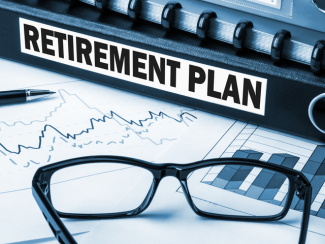
How much money do I need to retire?
Depending on which perspective you might be reading this article, retirement is something you look forward to as you’ve planned financially for it and know that you’ll be taken care of. Or, you could be viewing retirement as something a bit more precarious and daunting as you’ve not prepared for this event from a young age.
Listen, planning for retirement is scary and unless you have the guarantee of a wealthy family fortune or massive pay-out by winning the lottery, chances are, you’re in the same camp as most Americans – working hard to ensure your old age financial needs are met.
Having said all of this and knowing the bottom line is we need to be prepared for the day when we retire, have you pondered how much moolah you’d need for this next phase in your life?
I know I have! As a Certified Financial Planner ® it’s important to put my money where my mouth is and apart from leaving my legacy behind, I want to educate and enrich your life by sharing what I deem to be very important and resourceful information to equip you on the road to a stress-free retirement.
So, let’s get started, folks. Let’s chat about how much money you’ll need to retire.
How much money will you need to retire in the USA?
No matter how brilliant a job you’re doing, either by running your own business or working for a company, the fact that we are mere mortals means we get old and inevitably won’t be able to carry on doing our jobs anymore.
Retirement is another milestone reached – and one to be proud of as not everyone is fortunate enough in life to have reached their golden years.
As per an Investopedia update as of Dec 12, 2018, every October the Social Security Administration (SSA) announces its changes to the Social Security program. As of 2019, the absolute earliest you can start claiming Social Security retirement benefits is 62. However, claiming before your full retirement age will result in the payout being permanently reduced. For those who turn 62 in 2018, the full retirement age is 66 and four months. But for those who turn 62 in 2019, the full retirement age will increase to 66 and six months. The full retirement age is set to increase by two months each year until it hits 67. So, for anyone born in 1960 or later, the full retirement age will be 67.
Based on this information, it is important to figure out how much money you need to retire. Unless you are an actuary, figuring out how much money you need to retire can be quite a daunting task as there are many formulas and mathematic calculations that come into play when determining how much is needed to retire.
How much money do you need as a senior?
Now, to determine how much money is needed in your retirement in your senior years, you need to figure out how much you're planning to spend once you reach this great milestone. Once you have this number calculated, you are then able to consider your sources of retirement income and make sure that the expected income matches the expected outflow. As is the norm with budgeting, if the numbers don’t add up, then you’ll need to adjust your expectations and scale down your expenses or, if you’re able to, find ways to increase the income available to you in retirement.
How will taxes affect your retirement spending?
One can always be certain of taxes entering any equation and yes, you guessed it – take into consideration that you’ll be taxed on withdrawals from many retirement investment accounts, including 401(k)s and traditional IRAs. Remember though, you aren't taxed on Roth accounts, provided you comply with specific requirements such as not taking money out within five years of opening the account.
By way of calculations, if you’re a high-income earner, you could be taxed as much as 85% of your Social Security benefits, which are taxed at your income bracket from year to year. When income is above $25,000 for singles and $32,000 for married couples filing jointly, federal taxes begin on these benefits. It's important to note the income for these purposes doesn't mean total income; it's calculated by adding up half your Social Security benefits and all your taxable income that's not from Social Security, like pensions, distributions from 401k’s, traditional IRA’s, annuities, etc.
Where will my retirement money come from?
If you are in the fortunate position to have a guaranteed-income pension and you add in your projected Social Security benefits, these funds may be enough to provide the bulk of your financial support.
Unfortunately, most people simply don’t have defined-benefit pensions (these are plans in which employers guarantee a certain amount of monthly income for life). It is more common to have a defined-contribution plan, such as a 401(k), or to have no plan at all.
If your retirement income is derived primarily from 401(k) contributions you make, or if you don't have a workplace plan, you'll need to be aggressive in setting aside funds to have enough for your senior years, especially as Social Security benefits alone may not enough to support you.
How much money do you need to retire at age 55?
When planning for your retirement years, there are no rules set in stone, but I can tell you, that the younger you start, the easier saving for your retirement will be.
If you’re a 25-year-old professional and you’ve started planning for retirement now to retire at the age of 55, keep at it! Let’s assume you’re putting away $350 per month, be diligent and plan on increasing that amount each year.
On the flip side, if you’re heading for 40, or older and you’d like to retire by 55, this may be a little more challenging. If you’re willing to commit to the changes needed to make this a reality, then it is still possible.
The Financials
To retire relatively comfortably, consider a low-cost lifestyle. I’m not suggesting you pitch a tent in your children’s backyard, but perhaps an RV-type lifestyle might be fitting for ages 55 – 65. The aim here would be to then settle down at the age of 66 in a house with a more traditional lifestyle again. Discussing these options with your financial advisor is a good exercise in assessing how much you’ll need to pay for things at certain phases of your retirement.
As mentioned earlier, Social Security doesn’t kick in until you’re 62, at the earliest. In most cases, it's tricky trying to access retirement account money before age 59½ without paying penalties.
There are however ways to do this. If you are retiring at 55, you’re most likely going to need other resources of money you can tap into.
One option is to consider using IRC 72(t), which will allow you to withdraw from an IRA at an early age. A 72(t) payment allows you to take money out of an IRA before age 59½ and avoid the 10% early withdrawal penalty tax, but there are specific rules in using this strategy that you must adhere to. Work with your advisors to assess if this option is a good one and if it is how to set it up correctly. Keep in mind that if you use this strategy it could hurt your long-term retirement income projections.
Although you can start Social Security at 62, there are many reasons you might consider starting to withdraw benefits at a later age. The longer you wait (the maximum is age 70), the higher your monthly benefit will be. Certainly, something to consider and discuss with your financial advisor.
How much should you have saved for retirement by 50?
Having made it to 50 is something to be celebrated and the retirement years are on the horizon. You’re most likely asking how much money you should have saved in order to retire comfortably.
A quick calculation is by age 50 = 10X your annual expenses. To word it differently, if you spend $50,000 a year, you should have about $500,000 in savings. Your ultimate goal is to achieve a 20X expense coverage ratio to retire comfortably.
My suggestion is to start with 10% and raise your savings amount by 1% each month until you start feeling the pinch. Think of it as flexing your financial muscles – when you work out at the gym, the goal is to increase your fitness level or muscle mass – this is achieved by pushing the limits. The idea here is to get over the initial pinch and when it’s comfortable, to increase the rate by 1% per month again. Wash. Rinse. Repeat. If you can save more than $200,000, then keep at it and save more if you can. If you haven’t started at all then start with a smaller amount, just something. You won’t miss it and then can increase it moving forward.
Remember, the person you are today is the person who will be taking care of the person you are in retirement. In other words, you are responsible for yourself, now and in the future, so do yourself a favor and save!
To plan for your retirement and be financially comfortable, think of your life expectancy as a timeline broken down as follows:
Your 20s:
This is the accumulation phase of your life and you’re job hunting for a career with a decent salary or starting a company. Try your hardest to stay away from debt! Aim to save at least 10-25% of your after-tax income and if you’re able to, save 10-25% after tax, after 401K and IRA contributions up to company match.
Your 30s:
You’re still in the accumulation phase and should be more settled in your career or business. If you’ve saved 25% of your after-tax income for four years, you will reach one year of coverage. If you save 50% of your after-tax income a year for five years, you will have reached five years of coverage. Keep going, you’re doing well!
Your 40s:
You’re beginning to hit a mid-life crisis and might be contemplating a complete change of career or a Ferrari. Not so fast tiger! By now you’re somewhat established, have a family, and might be looked up to as a reliable spouse, parent, business owner, executive, etc. The fact that you’ve accumulated 3-10X worth of living expenses in your 40s means that you are coming ever closer to being financially free. Stay focused and keep on with those savings.
Your 50s:
If you’ve stayed focused and got through the mid-life crisis, then by now you’ve accumulated 7-13X your annual living expenses. Way to go! You are 100% in tune with your spending habits and therefore, you raise your savings rate by another 10% to supercharge the final lap.
Your 60s:
You made it! You have accumulated 10-20X+ of your annual living expenses and no longer have to work! Your nest egg has grown large enough that it’s providing you hundreds, if not thousands of dollars of income from interest or dividends. Full Social Security benefits kick in at age 70 now (from 67), but that’s OK since you never expected it to be there when you retired.
Can I retire on a million dollars?
One million dollars in most cases, given my experience, is simply not enough to retire for those of us under the age of 60 right now. Social Security is projected to start paying us less, pensions are all but a dream, and the stock market can play major games with our money and emotions at the drop of a hat.
You might be reading this thinking you’re a long way from a $1 million retirement fund. If your retirement is creeping up a little quicker than you’d like, don’t give up on building that nest egg. But keep in mind that although it sounds like a large number, one million dollars, given our projected expenses in retirement for 30+ years, simply does not appear to be enough anymore. 30, 40, and 50 years ago it was plenty, but life has changed and we must change with it, thus our retirement planning needs to change. If you are close to retirement and won’t be able to save up enough of a nest egg you can always cut expenses to make a smaller amount of savings work, you can get to where you need to be, without selling your house or having to work forever.
We know that housing is a large expense before and after retirement and any savings there will go a long way toward filling your savings gap. The other large bill in retirement is for your health. Whether it is multiple hospital visits or a long-term care health event, these are expenses that should be planned for way in advance otherwise they can derail your retirement in an instant.
If you’re able to cut back on other expenses, the nest egg doesn’t have to be as big. As with anything, exercise caution here and speak with your financial advisor about your retirement savings. You’re still going to need money to sustain you for a good 30+ years or so whilst in retirement.
How Much Do You Need to Retire?
Most people will assume that since they are retired their expenses all of a sudden go down, so they don’t need as much income in retirement. This may be true in some circumstances, but who wants to make less in retirement? These are supposed to be some awesome years to enjoy life!
If you’ve paid off your mortgage and you’re in excellent health, then I would say that 70% of your pre-retirement yearly salary could work to live comfortably when you retire.
If you plan to travel around the world or build your dream house then you’re going to need 100% of your annual income or more.
One of the key factors is to be realistic about what kind of expenses you’ll have in retirement. It’s important to estimate correctly when it comes to figuring out how much you need to save in order to be financially comfortable in retirement.
One way to begin estimating your retirement costs is to take a close look at your current expenses in various categories, and then estimate how they will change. Your mortgage might be paid off by then and you won't have travel or commuting costs to contend with. Unfortunately, your healthcare costs are likely to rise though.
Also, remember that every day in retirement is a Sunday. What I mean by this is that you will have a lot more free time on your hands. So, whether you use that time to travel, spoil the grandkids, play golf, or whatever, these things all cost money, money that you were not previously spending.
There’s no magic wand to ensure we’ll be financially ready for retirement, but there are resources and honest, knowledgeable professionals out there who can point you in the right direction. As with so much in life if you don’t have a plan to reach your target, how will you get there?
I hope you’ve found this article beneficial.
Thanks for reading!
Cheers,
Derek





